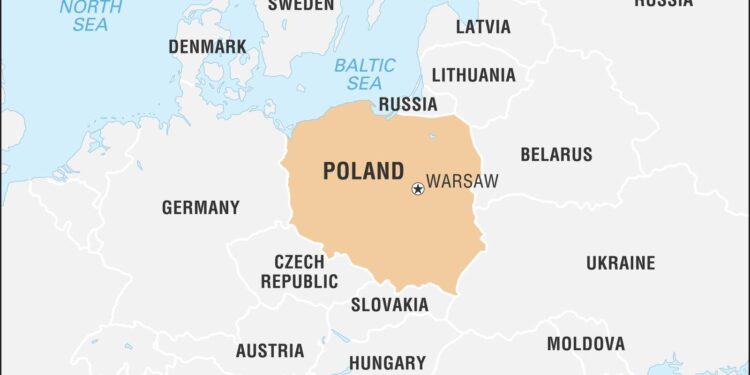Rising Tensions in Eastern europe: Spotlight on Poland and the Baltic Region
The escalating strains in Eastern Europe have reached a critical point, as Russian officials have warned that Poland and the Baltic states will be among the first to face repercussions if NATO were to engage militarily against Russia or Belarus.This statement underscores the intricate geopolitical dynamics at play as NATO bolsters its presence in this area, raising alarms about a potential escalation of conflict. with deteriorating relations between Russia and Western nations, any aggressive moves could considerably impact the security landscape of Eastern European countries. This article delves into the origins of these tensions, assesses the strategic importance of Poland and its Baltic neighbors, and explores their broader implications for regional stability and international relations.
Poland and Its Neighbors: The Frontline of NATO-Russia Tensions
As NATO recalibrates its strategies amid ongoing hostilities with Russia, Poland along with Estonia, Latvia, and Lithuania stands at a pivotal crossroads regarding possible military confrontations. The russian government has issued stark warnings that these nations could “be among those who suffer first” should NATO take military action. Their geographical proximity to Belarus’s contentious border coupled with increased Russian military activities amplifies their vulnerability.analysts suggest that this risk arises not only from their location but also from their status as frontline states within NATO‚Äôs eastern defense framework.
In response to these threats, Poland along with Estonia, Latvia, and Lithuania has taken proactive measures to bolster their defenses through enhanced collaboration with NATO allies. Historically cautious towards Russia due to past experiences, recent escalations have prompted these countries to seek greater military support through several key initiatives:
- Increased troop deployments across borders aimed at deterring potential incursions.
- Significant investments in modernizing military technology and infrastructure.
- Joint military exercises conducted alongside NATO allies to enhance operational readiness.
With stakes higher than ever before, global observers are closely monitoring developments in Eastern Europe. A recent analysis highlights current military capabilities across Poland and its Baltic counterparts‚ÄĒillustrating their preparedness for any potential aggression:
| Country | Active Personnel | Defense Budget (USD Billion) | Deployed NATO Troops |
|———–|——————|——————————|———————–|
| Poland | 120,000 | 18.7 | 4,500 |
| Estonia | 6,000 | 0.6 | 1,000 |
| Latvia | 5,000 | 0.5 | 1,500 |
| Lithuania | 20,000 | 1.1 | 1,200 |
Moscow’s Warning: Consequences for Regional Stability
Moscow’s recent caution regarding possible actions by NATO has sent shockwaves throughout Eastern Europe‚ÄĒraising concerns about regional security stability. Russian officials have made it clear that if direct confrontations involving either Russia or Belarus were initiated by NATO forces; it would be countries like Poland and those in the Baltics who would face immediate consequences first-hand.
several factors contribute significantly to understanding why Poland along with its Baltic neighbors are particularly vulnerable:
- Geographical Vulnerability: Their locations make them susceptible to rapid retaliatory actions.
- Cultural Anxieties: historical conflicts with Russia continue fueling fears among these nations.
- Military Preparedness:The adequacy of current defense resources against emerging threats remains a concern.
- NATO Cohesion:The effectiveness of solidarity within NATO amidst potential aggressions is crucial.
The balance of power within this region is increasingly precarious; Moscow’s warning serves as a stark reminder about how fragile security arrangements can become under pressure from external forces such as an aggressive alliance pursuing expansionist policies like those seen from NATOs side.
Pivotal Strategies for Enhancing Regional Security
Considering Moscow’s alarming assertions concerning rising tensions; it becomes essential for stakeholders‚ÄĒincluding local governments & international partners‚ÄĒto reassess strategic frameworks aimed at effectively enhancing regional security across both Polish & Baltic territories through various initiatives:
- Sustained Military Presence:Maintaining robust troop levels via regular joint drills while rotating forces into high-risk areas can effectively deter adversarial moves .
- Intelligence Sharing: Establishing complete intelligence-sharing networks amongst all members will ensure timely responses against emerging threats .
- Cybersecurity Investments: Investing heavily into advanced cyber capabilities will safeguard vital infrastructures while maintaining open channels necessary during crises situations .
Moreover fostering diplomatic dialogues alongside reinforcing defensive postures remains paramount moving forward‚ÄĒinitiatives may include:
- <li Engaging local communities through resilience-building programs designed specifically counteract misinformation campaigns propagated externally .
– Strengthening economic ties throughout regions creates interdependencies which could serve beneficially during times requiring de-escalation efforts between conflicting parties involved directly or indirectly related issues arising out disputes over territorial claims etcetera…
– Regular consultative meetings focused around shared concerns surrounding national securities help mitigate misunderstandings leading possibly disastrous miscalculations down line!
<h3
The heightened rhetoric emanating from Moscow concerning prospective repercussions tied directly back towards actions taken by NATOs member states underscores just how fragile existing balances remain when discussing matters pertaining overall safety/security across entire regions such as those found within East-Central European landscapes today! With both frontline actors playing pivotal roles amidst larger geopolitical narratives unfolding globally‚ÄĒit becomes increasingly critical we navigate carefully through turbulent waters ahead ensuring vigilance/resilience remain top priorities moving forward!
















